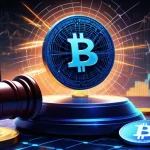Tom Emmer Reintroduces BRCA to Protect Blockchain Innovators from Regulatory Overreach

Tom Emmer’s Bill Shields Blockchain Innovators from Regulatory Overreach
On May 21, 2025, U.S. Representative Tom Emmer, alongside Congressman Ritchie Torres, reintroduced the Blockchain Regulatory Certainty Act (BRCA). This critical legislation seeks to protect blockchain developers and service providers from being improperly labeled as financial service providers if they do not custody user funds. The bill is a vital step to encourage innovation in the U.S. crypto industry, especially as other countries compete for dominance.
- Tom Emmer and Ritchie Torres reintroduce BRCA.
- Aim to protect blockchain developers not handling user funds.
- Bill backed by industry leaders, emphasizing its importance.
The BRCA, which originally faced hurdles when introduced in 2023, addresses the pressing need for regulatory clarity in the blockchain sector. Blockchain developers, who create and maintain the technology behind cryptocurrencies, often find themselves navigating a complex regulatory landscape. Emmer emphasized the urgency of the bill, stating,
“If we want to keep the next generation of builders in the United States, this kind of legal clarity is essential. We cannot afford to let outdated or misapplied regulations drive American talent and technology overseas. With this bill, we protect innovation, uphold civil liberties, and strengthen our global competitiveness in the 21st-century economy.”
Without clear regulations, there’s a risk that digital asset technology and talent will migrate to more welcoming jurisdictions, potentially undermining U.S. leadership in the crypto space.
Industry leaders have rallied behind the BRCA, recognizing its significance. Peter Van Valkenburgh from Coin Center highlighted,
“The Blockchain Regulatory Certainty Act is the best way to protect American crypto developers and innovators from undue regulation by prosecution.”
Amanda Tuminelli of the DeFi Education Fund added,
“The bill would protect developers of non-custodial, peer-to-peer software protocols from being unreasonably defined as operators of unauthorized financial operations under the Bank Secrecy Act.”
These endorsements underline the broader industry support for the bill, which aims to clarify that those who do not handle user funds should not be subjected to regulations meant for financial intermediaries.
Cody Carbone, CEO of The Digital Chamber, succinctly captured the essence of the bill, stating,
“Blockchain developers, miners, and validators aren’t financial institutions but they’re builders. The bill will finally give them the freedom to build in the U.S. by clarifying that those who never hold customer assets don’t need bank-style licenses.”
This perspective aligns with the ethos of decentralization and the spirit of effective accelerationism (e/acc), pushing forward the boundaries of what’s possible in the financial and technological realms.
While the BRCA enjoys broad support and aims to bolster U.S. leadership in the crypto space, it’s important to remain cautiously optimistic. The crypto landscape is riddled with complexities and challenges, from regulatory uncertainties to the ever-present threat of scams and fraudulent schemes. Yet, the potential of blockchain technology to disrupt the status quo and empower individuals through decentralization and privacy cannot be overstated. The bill represents a crucial step in aligning regulatory frameworks with the realities of blockchain development, but the journey toward a fully realized decentralized future is fraught with hurdles that must be navigated with care.
In this context, the BRCA serves as a beacon of progress, yet it’s essential to keep an eye on the broader implications and potential pitfalls. While Bitcoin maximalists might argue for a singular focus on BTC, the truth is that other cryptocurrencies and blockchain systems, like Ethereum, play vital roles in this evolving ecosystem. They fill niches that Bitcoin may not address, and understanding this diversity is key to a comprehensive view of the crypto revolution.
However, we must also acknowledge the potential shortcomings of the bill. Some critics argue that the BRCA doesn’t go far enough and that more comprehensive regulatory reform is needed to truly support the decentralized nature of blockchain technology. Others worry that the bill might inadvertently create loopholes that could be exploited by bad actors. These counterpoints are crucial for a balanced discussion on the future of cryptocurrency regulation in the U.S.
The reintroduction of the BRCA comes at a critical juncture for the U.S. as it grapples with how to regulate the burgeoning cryptocurrency and blockchain sectors. The previous failure of similar legislation in 2023 highlights the ongoing challenges in achieving regulatory clarity. Yet, with the backing of industry leaders and a clear vision for protecting innovation, the bill stands as a testament to the resilience and determination of those advocating for a more just and decentralized future. Let’s hope it clears the hurdles this time around, paving the way for a new era of blockchain development in the U.S.
Key Takeaways and Questions
- What is the Blockchain Regulatory Certainty Act (BRCA)?
The BRCA is a proposed legislation aimed at providing legal clarity and protection for blockchain developers and service providers who do not handle user funds, ensuring they are not misclassified as money transmitters.
- Who reintroduced the BRCA bill?
U.S. Representative Tom Emmer, along with Congressman Ritchie Torres, reintroduced the BRCA bill on May 21, 2025.
- What are the potential risks of delaying regulatory clarity for blockchain developers?
Delaying regulatory clarity risks pushing digital asset technology and talent overseas, which could harm U.S. investors and innovators, and undermine U.S. leadership in the crypto space.
- How does the BRCA bill aim to protect blockchain developers?
The bill protects developers by ensuring they are not unreasonably defined as operators of unauthorized financial operations, especially if they do not custody consumer funds, thus fostering innovation and protecting civil liberties.
- Who supports the BRCA bill and why?
The bill is supported by key figures such as Peter Van Valkenburgh, Amanda Tuminelli, Sarah Milby, Cody Carbone, Kristin Smith, Miller Whitehouse-Levine, and Ji Hun Kim, who believe it will protect developers from undue regulation, support U.S. innovation, and prevent unnecessary compliance burdens.



